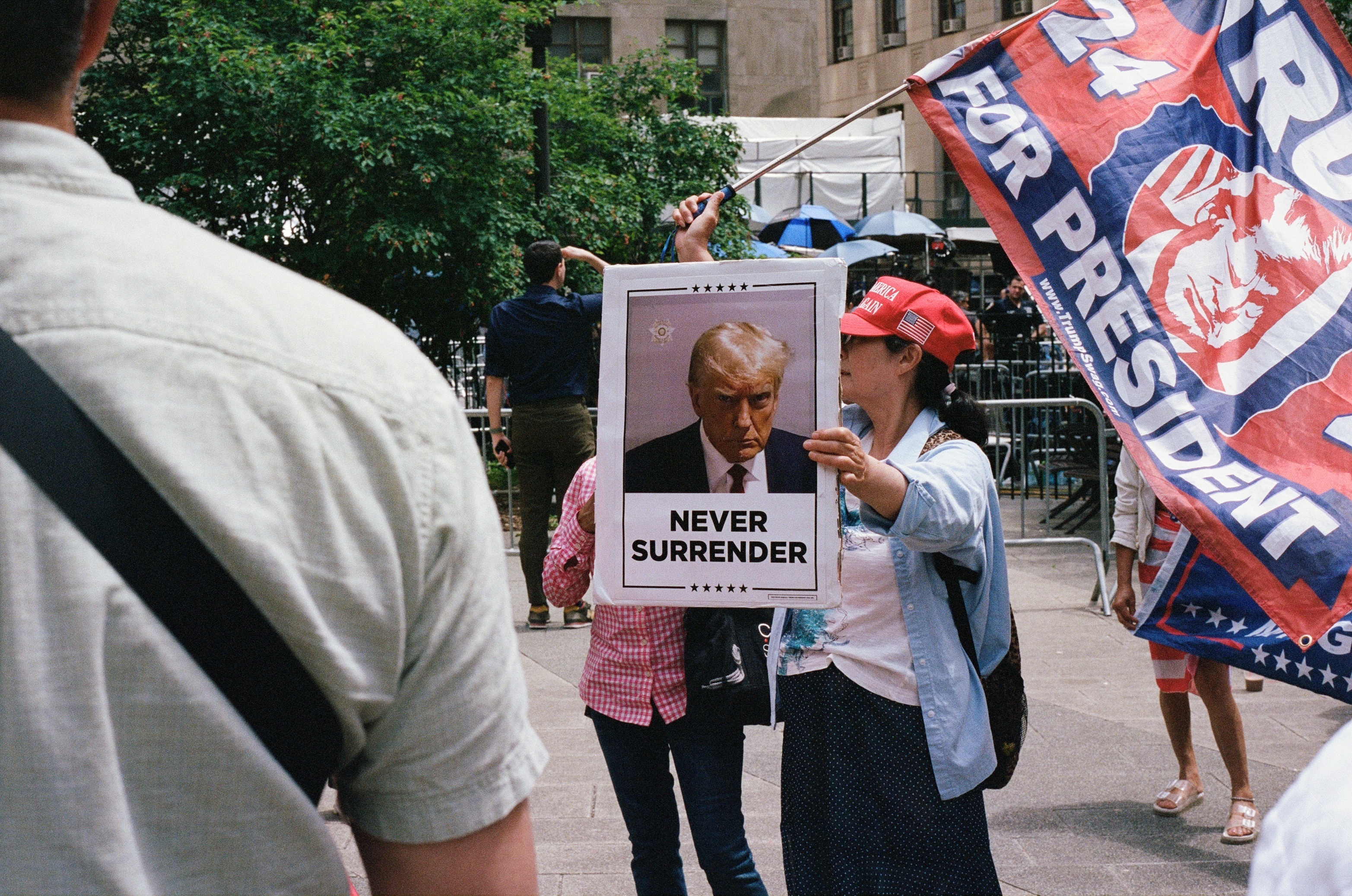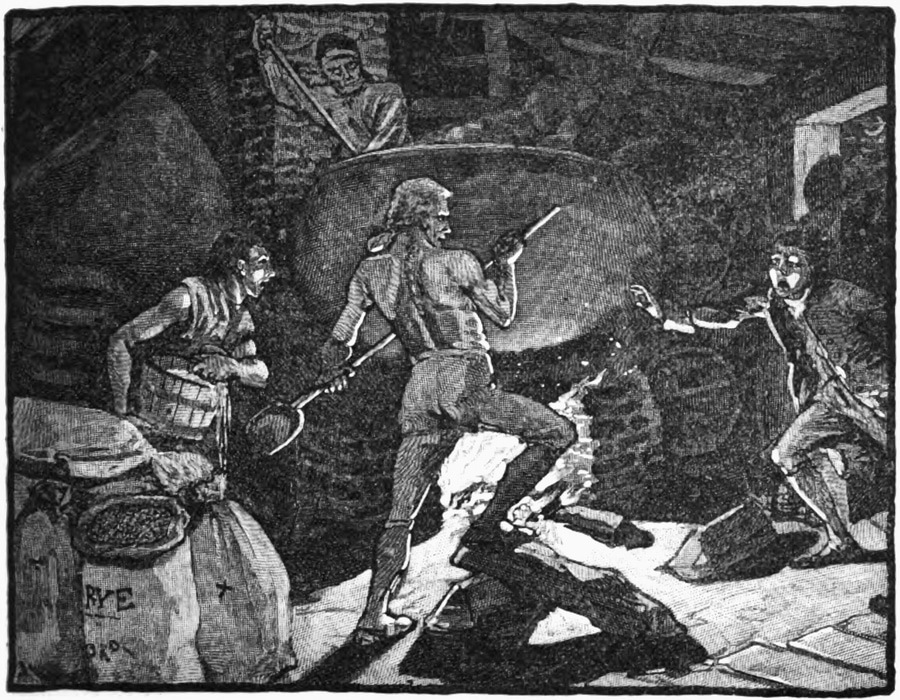“We, the jury, have a verdict”
Part II of a final dispatch from the New York Trump trial.

Published by The Lawfare Institute
in Cooperation With

Previously on Trump New York Trial Dispatch: "From Arguments to Instructions"
May 30, 2024
It’s a cool summer morning outside the Manhattan criminal courthouse, where members of the press are lined up for what could be the climax of Trump’s criminal trial.
“Is today the day?” one of us asks the now familiar law enforcement officers who stand guard in front of the line to get into courtroom 1530.
“Not a chance,” one of them replies.
“I sure hope so,” the other one says.
After more than six weeks of trial proceedings, the feeling around the courthouse is that everyone—the press, the court officers, the public at large—is ready for a verdict, whatever that verdict might be.
But whether that verdict comes sooner, rather than later, is up to the twelve New Yorkers who file into the jury box shortly after 9:30 a.m. They’re here to resume deliberations over whether or not to label a former President a felon—and, if so, how many times.
But first the jurors will listen to excerpts of the testimony they requested yesterday. They’ll also hear Justice Merchan reread the jury instructions—or, at least, portions of the jury instructions.
Shortly before the jurors entered the room this morning, Justice Merchan announced that he received another note from the foreperson: “We, the jury, request: First, that the read-back of the instructions begin with the description of how the jury considers the evidence and what inferences can be drawn from the facts—for example, the rain metaphor—through the description of the law with respect to Count 1.”
Justice Merchan, after conferring with Todd Blanche, determined that this request encompasses pages six to thirty-five of the jury instructions.
Now, having brought the jurors back into courtroom 1530, Justice Merchan begins to read aloud from the jury instructions. He reiterates how the jury should consider evidence in the case—what it means, for example, to draw an inference from facts introduced into evidence. Then he moves on to his limiting instructions about the evidence that the jury can consider only for a limited purpose—that is, AMI’s non-prosecution agreement can only be used to evaluate David Pecker’s credibility and the surrounding circumstances. He next addresses instructions on, for example, the meaning of “accomplice as a matter of law” and “accessorial liability.” He ends by elaborating on the specific elements of the charges in this case: the meaning of “intent to defraud,” the “object offense” under New York election law § 17-152, and the prosecution’s theories as to which “unlawful means” were allegedly used to carry out that object offense.
Once Justice Merchan wraps up with his jury instructions, he turns the floor over to today’s star witnesses: A pair of court reporters, who are here to read aloud from the four transcript excerpts requested by the jurors yesterday. One court reporter positions herself behind the lectern, while the other seats herself behind the witness stand. Speaking in thick “New York-ah” accents, the women re-enact the requested witness testimony from both David Pecker and Michael Cohen. There’s a community theater vibe to it all, but the jurors listen with rapt attention, many of them taking notes as the women recount Cohen and Pecker’s testimony related to the 2015 Trump Tower meeting, as well as Pecker’s testimony regarding a June 2016 phone call with Trump and AMI’s decision to back out of the agreement to reassign McDougal’s life rights to Cohen and Trump.
When the court reporters conclude their star turns in the trial of the former President, Justice Merchan instructs the jurors to step out of the jury box and return to the deliberation room. He excuses the parties.
Trump, wearing a cobalt-blue tie today, purses his lips as he walks down the center aisle to return to his holding room, where reports say that he has recently installed a television set to pass the time.
Then the waiting game begins, again.
For several hours, the reporters await the news in the real “icebox”: A holding room where reporters can access their phones while waiting for some news—any news—from the jury room. In comparison to the relatively toasty courtroom, the holding room is downright frigid.
We pass the hours with work and gossip. One reporter polls the room on whether the sound we hear when the jury has a note is a “buzzer” or a “bell.” (“It’s a buzzer-bell,” one of us concludes.) Another spends hours sketching the concept art for a new tattoo. Others speculate about the internet connectivity problems in courtroom 1530. Is it the Secret Service? Is it interference from Trump’s new TV? What are we going to do if the WiFi cuts out during the verdict? Haha, we all laugh. Surely not. No way. Not gonna happen. Right?
As the day wears on without any news from the jury room, many of us begin to suspect that we will be back tomorrow. As the clock ticks toward 4:30 p.m.—the time when the jurors are usually excused for the day—reporters begin to migrate back to courtroom 1530. No one has heard the buzzer, bell, or buzzer-bell since yesterday, but there’s a sense that something is about to happen.
Around 4:13 p.m., Trump returns to the courtroom, followed by his defense team and a smaller group of his usual entourage: Alina Habba, Boris Epshteyn, Eric Trump. Melania and Ivanka Trump remain conspicuously absent, as they have been for the entire trial.
Justice Merchan enters and takes his seat behind the bench. “I asked you to come down at 4:15 just to make you aware that, at this time, I’m going to excuse the jury at 4:30 p.m.” We’ll give them a few more minutes, and then we’ll excuse them, he adds.
Justice Merchan steps off the bench and disappears behind a door on the left side of the courtroom.
No verdict today—or so it seems.
As we wait for Justice Merchan to reappear with the jurors, the defense team seems to be in unusually high spirits. Blanche cups his mouth and leans over toward Trump, whispering in his ear. They are smiling, laughing, relaxed.
Those of us in the gallery, however, are on edge as the clock ticks past 4:30 p.m. and the ever-prompt Justice Merchan has not yet reappeared. A reporter seated next to us—MSNBC’s Lisa Rubin—begins to suspect that something is brewing. Silence falls over the courtroom.
Minutes later, Justice Merchan finally arrives back in the courtroom. We received a note from the jury at 4:20 p.m., he explains. It reads:
“We, the jury, have a verdict.”
As he reads the note aloud, gasps echo through the gallery. “Oh my god,” one reporter says. “Oh my god,” she repeats.
“It’s happening,” someone else whispers.
Justice Merchan explains that the jurors requested additional time to fill out the verdict form. The judge says he’ll be back in a few minutes.
“Please, let there be no outbursts, no reactions of any kind once we take a verdict,” Justice Merchan says before he departs.
Over at the defense table, the mood shifts: Trump, who minutes earlier had been smiling and laughing with his attorney, now sat stone-faced, arms crossed across his chest.
The mood shifts among the press seated in the gallery, too, as reporters frantically try—and fail—to connect to the internet. We’re about to witness history and we can’t even tell anyone about it, one of us says. Another reporter throws her hands up in frustration and declares that she’s going old school. She closes her laptop and rummages through her bag, searching for a pen and paper.
Half an hour passes before Justice Merchan reappears. The jurors file back into courtroom 1530. None of them look at Trump as they take their seats in the jury box.
Justice Merchan directs his attention toward the jury box. “Mr. Foreperson, without telling me the verdict, has the jury in fact reached a verdict?” he asks.
The foreperson—an Irish immigrant—speaks with the accent of his home country as he replies: “Yes, they have.”
Justice Merchan turns the floor over to a court clerk.
“Will the foreperson please rise?” the clerk asks. The foreperson, clad in a blue sweater, rises from his seat in the front corner of the jury box.
How say you to Count One?
“Guilty.”
The clerk asks the same question of the remaining 33 counts, to which the foreperson replies with the same answer: Guilty. Guilty. Guilty. Guilty. Guilty. Guilty. Guilty. Guilty. Guilty. Guilty. Guilty. Guilty. Guilty. Guilty. Guilty. Guilty. Guilty. Guilty. Guilty. Guilty. Guilty. Guilty. Guilty. Guilty. Guilty. Guilty. Guilty. Guilty. Guilty. Guilty. Guilty. Guilty. Guilty.
By the time they reach the fifth or sixth count, there is a monotonous rhythm to this call-and-response between the clerk and foreperson.
As the guilty verdicts stack up, Trump sits impassively at the defense table. Here is a man who has mythologized himself as a great showman, his whole life a performance of bravado and bluster. In each of his roles—The Donald, The Boss, The President—he has created and capitalized on America’s obsession with spectacle. But for a few moments in a drab Manhattan courtroom, Trump drops the performance. He stares ahead, expressionless.
When the foreperson finishes reading the verdict, the defendant—a former President of the United States and the presumptive Republican presidential nominee—has been found guilty on all 34 felony counts. The clerk asks the parties if either side would like to poll the jurors individually to confirm their decision. “Yes, please,” Blanche croaks softly.
Trump, for the first time, turns his head to look over at the twelve New Yorkers who just declared him a criminal. One by one, they each confirm the verdict.
Justice Merchan thanks the jurors for their service. And he tells them that they are now free to discuss the case with anyone they would like to discuss it with. “But you're also free not to,” he continues. “No one can make you do anything that you don't want to do. The choice is yours.”
After six long weeks of jury service, the jurors are excused. They file out of the room, averting their eyes as they walk past the defense table where Trump is seated.
Once they’re gone, Blanche rises. His voice is quiet, almost shaky, as he asks the judge for a judgment of acquittal and to set the verdict aside.
There’s no way this jury could have reached its verdict without accepting the testimony of Cohen, he says. We believe Cohen lied in this courtroom, that there was perjury committed. “And there is no reason that the court should allow a verdict knowing that,” he concludes.
It’s a half-hearted effort from the usually energetic Blanche. He sounds, for the first time in six weeks, utterly deflated.
Justice Merchan stares at Blanche for a beat.
“I’m sure you misspoke when you said ‘knowing,’” the judge says. “You’re not suggesting that I ‘know’ anybody committed perjury, right?”
Correct, Blanche confirms.
Justice Merchan denies the motion for acquittal.
Then Blanche requests a sentencing date for Trump: Mid-to-late July would be ideal, he says, citing conflicts related to an upcoming hearing in Trump’s criminal case in the Southern District of Florida. The prosecution, for its part, doesn’t oppose a mid-July date.
“We will adjourn the matter for sentencing to July 11,” Justice Merchan announces. “We will order a probation report.” He tells Blanche that the clerk of court will provide instructions on how to go about scheduling a probation interview. And he sets deadlines for the parties to file motions ahead of the sentencing hearing: June 13 for the defense and June 27 for the prosecution.
Turning to Joshua Steinglass, the judge asks about Trump’s bail status. “There is no bail,” Steinglass replies. Mr. Trump remains released on his own personal recognizance, Justice Merchan says.
When court adjourns, Trump stands, wordless. He turns to his son, Eric Trump–his sole family member present for the reading of the verdict. He grasps Eric’s arm as the two exchange a firm handshake.
Then the former president walks down the center aisle toward the exit, followed by his defense counsel and entourage. He juts out his chin and stares straight ahead as he disappears through the courtroom doors.
Standing before reporters in the hallway outside the courtroom, Trump-as-showman is back. He performs an old routine for the cameras: The judge is corrupt. “Soros-backed D.A.” The trial was rigged. In fact, the “whole country is being rigged right now.” The real verdict is going to be Nov. 5. The country has gone to hell. We’re a nation in decline. “Millions and millions” of people are pouring in, from mental institutions and prisons. “And they’re taking over our country.”





.jpg?sfvrsn=8253205e_5)


